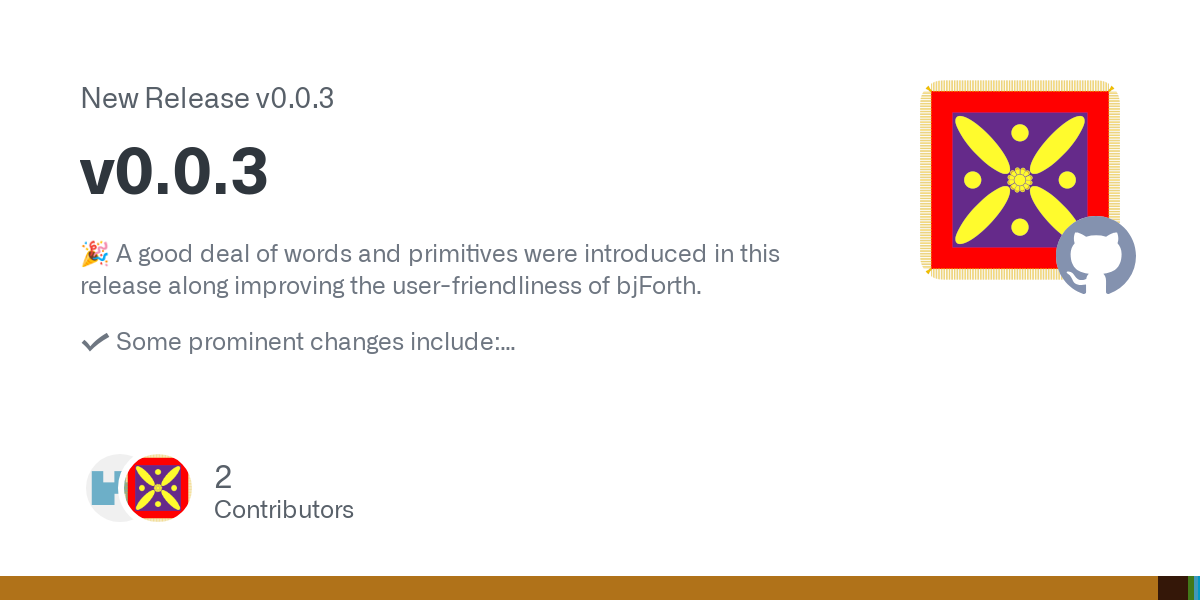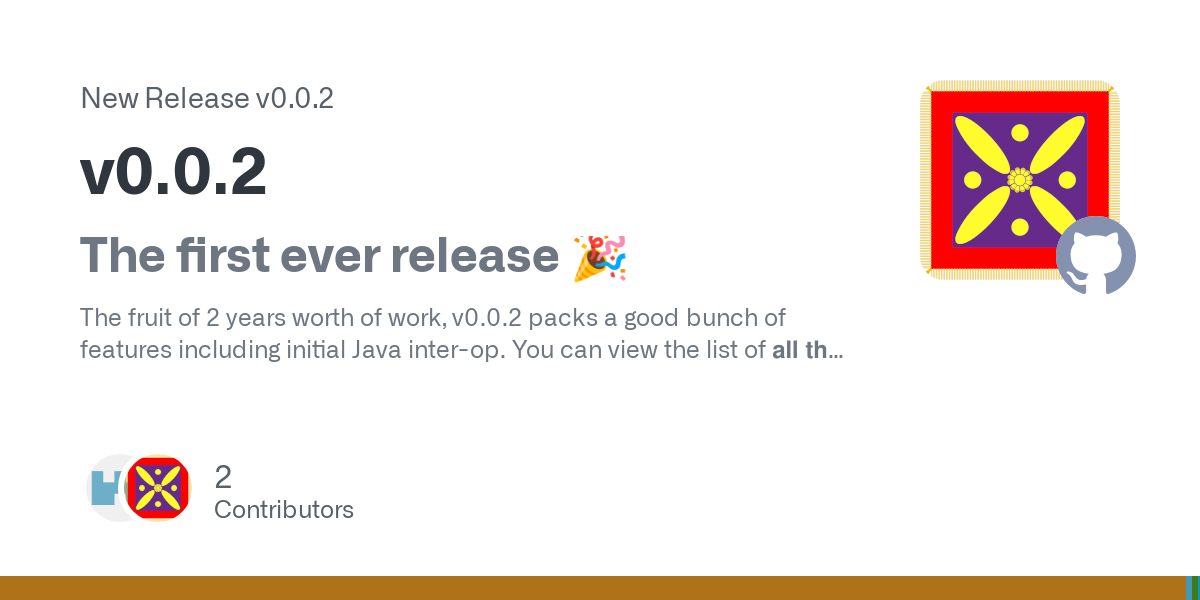bahmanm
Husband, father, kabab lover, history buff, chess fan and software engineer. Believes creating software must resemble art: intuitive creation and joyful discovery.
Views are my own.
- 21 Posts
- 41 Comments
Besides the fun of stretching your mental muscles to think in a different paradigm, Forth is usually used in the embedded devices domain (like that of the earlier Mars rover I forgot the name of).
This project for me is mostly for the excitement and joy I get out of implementing a Forth (which is usually done in Assembler and C) on the JVM. While I managed to keep the semantics the same the underlying machinery is vastly different from, say, GForth. I find this quite a pleasing exercise.
Last but not least, if you like concatenative but were unable to practice fun on the JVM, bjForth may be what you’re looking for.
Hope this answers your question.
Good question!
IMO a good way to help a FOSS maintainer is to actually use the software (esp pre-release) and report bugs instead of working around them. Besides helping the project quality, I’d find it very heart-warming to receive feedback from users; it means people out there are actually not only using the software but care enough for it to take their time, report bugs and test patches.


I’m not an 1.e4 or Sicilian player but this smells like wild tactical variations early in the game.
RE Go: Others have already mentioned the right way, thought I’d personally prefer
~/opt/goover what was suggested.
RE Perl: To instruct Perl to install to another directory, for example to
~/opt/perl5, put the following lines somewhere in your bash init files.export PERL5LIB="$HOME/opt/perl5/lib/perl5${PERL5LIB:+:${PERL5LIB}}" export PERL_LOCAL_LIB_ROOT="$HOME/opt/perl5${PERL_LOCAL_LIB_ROOT:+:${PERL_LOCAL_LIB_ROOT}}" export PERL_MB_OPT="--install_base \"$HOME/opt/perl5\"" export PERL_MM_OPT="INSTALL_BASE=$HOME/opt/perl5" export PATH="$HOME/opt/perl5/bin${PATH:+:${PATH}}"Though you need to re-install the Perl packages you had previously installed.


This is quite intriguing. But DHH has left so many details out (at least in that post) as pointed out by @breadsmasher@lemmy.world - it makes it difficult to relate to.
On the other hand, like DHH said, one’s mileage may vary: it’s, in many ways, a case-by-case analysis that companies should do.
I know many businesses shrink the OPs team and hire less experienced OPs people to save $$$. But just to forward those saved $$$ to cloud providers. I can only assume DDH’s team is comprised of a bunch of experienced well-payed OPs people who can pull such feats off.
Nonetheless, looking forward to, hopefully, a follow up post that lays out some more details. Pray share if you come across it 🙏
I’m nitpicking but can you properly quote your code?



That’s a fair point 👍 I just wanted to point out that I’m not the author.
As I said, I very much like the idea. It helps raise awareness around the current trend of switching licenses to curb competition/make $$$.


a list or database of projects that were open but then closed down
That’s a great idea! Esp if the list is actively maintained & updated.
Since I am NOT the author of this extension, do you think you could write down your thoughts on the project’s issue tracker?


Created an issue on the repo: https://github.com/galdor/github-license-observer/issues/5


It is: https://opensource.org/license/mit/
It’s most probably a bug in the addon. Best to report it on the repo’s issue tracker: https://github.com/galdor/github-license-observer/issues


Oops! My mistake 🤦 Updated the post.
Good point! I just replaced my LI profile photo w/ an abstract image 🍻


Magnus Carlsen and Alireza Firouzja will throw down
This promises to be fun…a lot! 📺 🛋 🍿
😆Can someone make a similar one for bluetooth devices too, pretty please?
NOTE: Today is NOT Mozilla’s birthday!
Fun read nevertheless 🙂


If the controversies, allegations, rumors and gossips are about firefox though it definitely is important.
…
the huge chunks of money firefox gets from their biggest competitorI think we’re confusing things here 🙂
Examples of topics relevant to Firefox
- [Hypothetical] Firefox collects user data w/o consent.
- [Hypothetical] Researchers found government backdoors X, Y and Z in Firefox code base.
- [Hypothetical] Firefox to disable Javascript by default.
Examples of topics NOT relevant to Firefox
- Mozilla’s contract w/ Google
- Mozilla’s political campaign
- Mozilla’s CEO allegedly being a selfish a-hole
Finally let’s not forget that Firefox is an open source project, the result of the collaboration of hundreds, if not thousands, of people over the past 2 decades. Despite Mozilla’s important role, there’s way more to Firefox and its potential future than the usual corporate gossip/controversies.
My humble 2 cents 🙂


I’d rather keep this community about Firefox the product and what it (doesn’t) brings to the table. That’s what I am, personally, interested in.
It’d be great if we could keep all the other things such as controversies, allegations, rumours, gossips, … contained in a “mozilla” community and tried our best to maintain the separation.


Interestingly “Bazzi” means “game” in Farsi 🤷♂️
Tell me something I don’t know already 😂 The challenge is helping non-techies understand why they should wean themselves off of FB 🤷♂️












Not really I’m afraid. Effects can be anywhere and they are not wrapped at all.
In technical terms it’s stack-oriented meaning the only way for functions (called “words”) to interact with each other is via a parameter stack.
Here’s an example:
TIMES-10is a word which pops one parameter from stack and pushes the result of its calculation onto stack. The( x -- y)is a comment which conventionally documents the “stack effect” of the word.Now when you type
12and press RETURN, the integer 12 is pushed onto stack. ThenTIMES-10is called which in turn pushes10onto stack and invokes*which pops two values from stack and multiplies them and pushes the result onto stack.That’s why when type
.Sto see the contents of the stack, you get120in response.Another example is
This simple example demonstrates the reverse Polish notation (RPN) Forth uses. The arithmetic expression is equal to
5 * (20 - 10)the result of which is pushed onto stack.PS: One of the strengths of Forth is the ability to build a vocabulary (of words) around a particular problem in bottom-to-top fashion, much like Lisp. PPS: If you’re ever interested to learn Forth, Starting Forth is a fantastic resource.